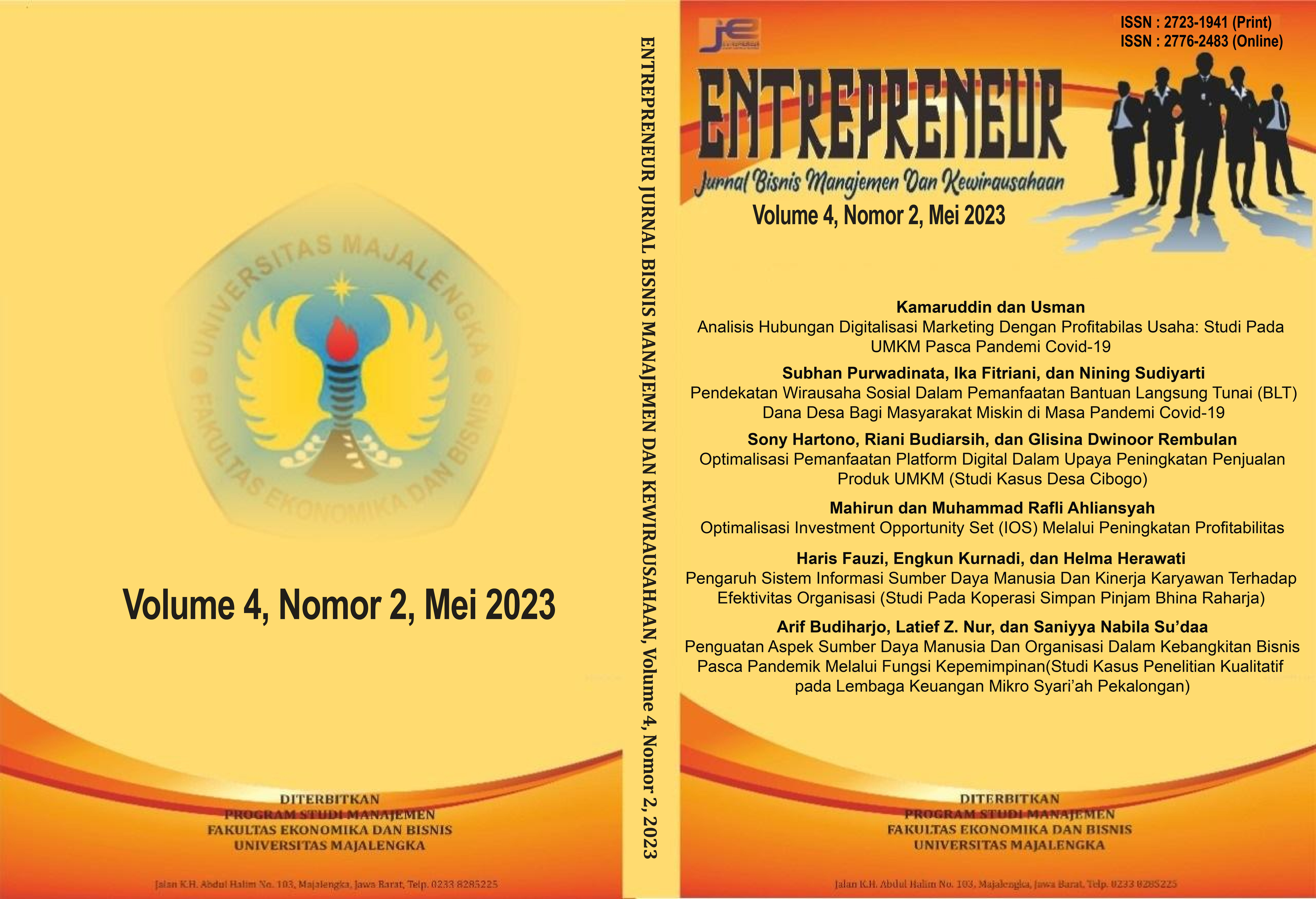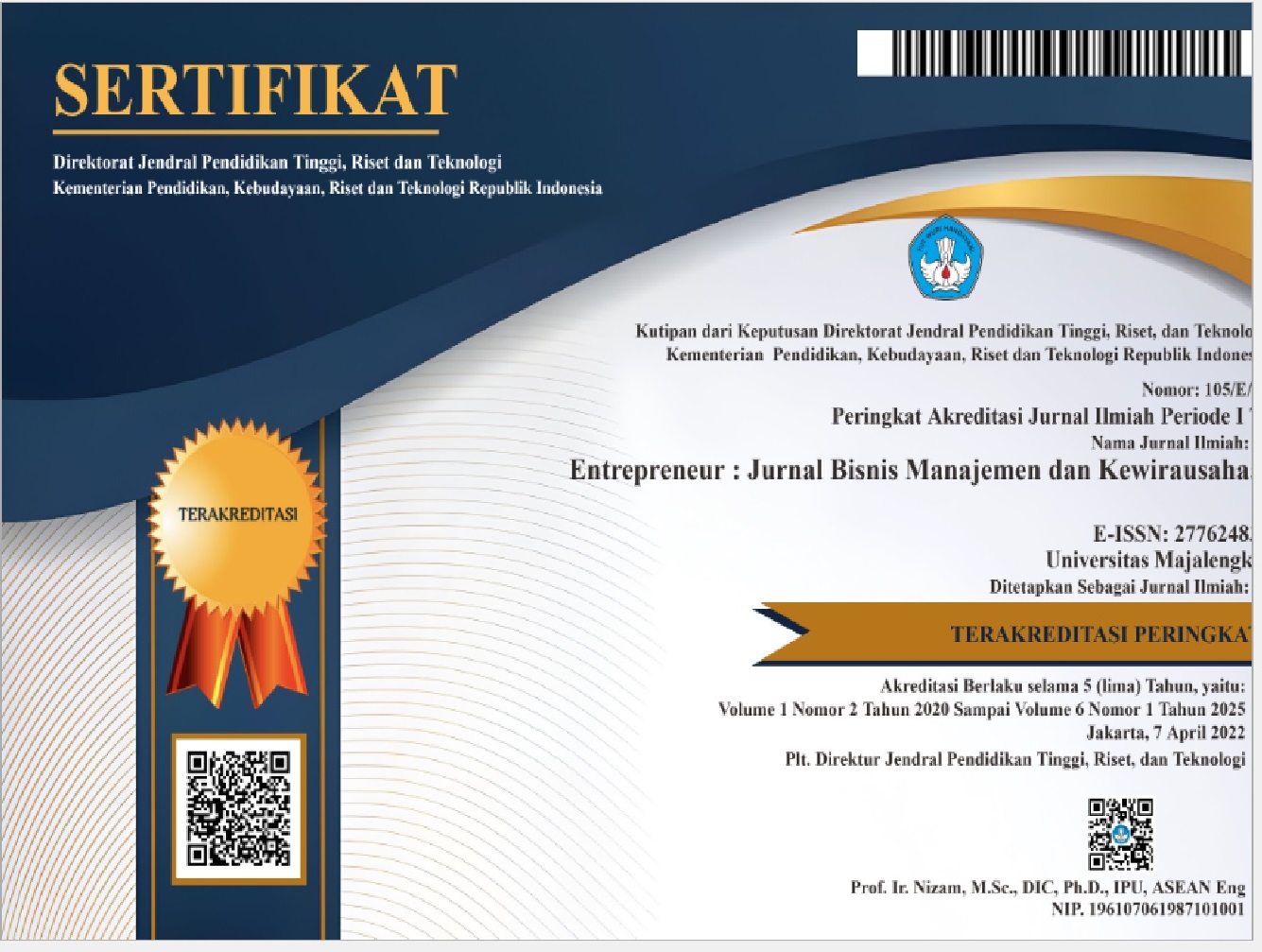Pengaruh Knowledge Sharing Terhadap Performance Dosen Dengan Kerja Tim Dan Inovasi Sebagai Variable Intervening Pada Universitas Majalengka
DOI:
https://doi.org/10.31949/entrepreneur.v4i2.5630Abstract
The knowledge sharing process is shown by the willingness of individuals in the organization to receive and disseminate information, knowledge and skills they have, how it affects lecturer performance with teamwork and innovation as intervening variables at Majalengka University. One of the study programs at Majalengka University has decreased SKP scores for the last 3 (three) years, namely the School Teacher Education Study Program Basic as a gap phenomenon, there is also a research gap, Rista Ramadhan Tri Wahyuni and Anang Kiatyanto (in 2013), and Danang Firmaiansyah (in 2014) stated that knowledge sharing has an influence on performance, according to research conducted by Salih Yesil, Alaedin Koska, Tuba Buyukbese (in 2013) showed that the results of knowledge sharing have no influence on performance. The next difference lies in the different research locations and fields. The method used a descriptive method with a quantitative approach, using questionnaires distributed through google forms. The research technique uses a Structural Equation Model (SEM) based on Partial Least Square (PLS). The results showed that the influence of knowledge sharing on lecturer performance had no effect. The relationship of knowledge sharing to teamwork has an influence. Knowledge sharing on innovation has an influence.The results of indirect testing state that teamwork is able to mediate the relationship between knowledge sharing and lecturer performance, in contrast to when mediated by innovation, it turns out that innovation is not able to mediate the influence of knowledge sharing relationships on lecturer performance. Although the sharing of high knowledge carried out by Majalengka University does not affect the performance of lecturers, it is different if it is intervening with teamwork.
Keywords:
Innovation;Knowledge Sharing;Lecturer Performance;TeamworkDownloads
References
Buku
Arikunto, S. (2014). Prosedur Penelitian Suatu Pendekatan Praktik. Jakarta:Adi mahasatya.
Fahmi, Irham. (2015). Manajemen Kinerja Teori Dan Aplikasi, Bandung:Alfabeta.
Herry, (2020). Manajemen Kinerja, Yogyakarta:Gava Media.
Kasmir, (2017). Manajemen Sumber Daya Manusia Teori Dan Praktik, Jakarta:Rajagrafindo Persada.
Lumbantobing, Paul. (2012). Manajemen Knowledge Sharing Berbasis Komunitas,
Bandung:Fajar Prasteya.
Moh. Nazir. (2017). Metode Penelitian, Bogor:Ghalia Indonesia.
Nadeak, Bernadetha. (2020). Deskripsi Kinerja Dosen Perguruan Tinggi Swasta Di Indonesia, Bandung:Widina Bhakti Persada.
Prawirosentono, S & Primasari, D. (2015). Kinerja Dan Motivasi Karyawan, Yogyakarta:BPFE-Yogyakarta.
Prabowo, H & Suwanda, D. (2022). Inovasi Pelayanan Pada Organisasi Publik, Bandung:Remaja Rosdakarya.
Raharso, S & Tjahjawati S. S. (2016). Organisasi Berbasis Pengetahuan Melalui Knowledge Sharing, Bandung:Alfabeta.
R.Cooper, D & S.Schindler. (2019). Metode Penelitian Bisnis, Jakarta:Salemba Empat.
Robbins, P. S & Judge, A. T. (2015). Perilaku Organisasi, Jakarta:Salemba Empat.
Rofiaty, (2012). Inovasi Dan Kinerja, Malang:UB Press.
Simanjuntak, P. (2012). Manajemen & Evaluasi Kinerja, Jakarta:Fakultas Ekonomi Universitas Indonesia.
Sinambela, L. (2018). Manajemen Sumber Daya Manusia, Jakarta:Sinar Grafika Offset.
Solihin, M & Ratmono, D. (2021). Analisis SEM-PLS Dengan WarpPLS 7.0 Untuk Hubungan Nonlinier Dalam Penelitian Sosial Dan Bisnis, Yogyakarta:Penerbit Andi
Sugiyono. (2021). Metode Penelitian Kuantitatif Kualitatif Dan R&D, Bandung:Alfabeta.
Sawan, F., et al, (2021). Knowledge Sharing Strategi Penguatan Perilaku Berbagi PengetahuanGuru Dalam Perspektif Servant Leadership, Yogyakarta:Nas Media Pustaka.
Wibisono, D, (2012). Manajemen Kinerja Konsep, Desain, Dan Teknik Mengingkatkan Daya Saing Perusahaan, Bandung:Erlangga.
Wibowo, (2013). Manajemen Kinerja, Jakarta:Rajagrafindo Persada.
Yukl, G, (2015). Kepemimpinan Dalam Organisasi, Jakarta:PT Indeks.
Jurnal
Ali Fikri, M, (2017). ” Analisis Pengaruh Berbagi Pengetahuan organisasi Terhadap Kinerja Organisasi Peran Pemediasi Inovasi Organisasi”. Jurnal Optimum Vol 7 No 2, 133-149.
Chalifa, N., & Nugroho, D, (2014).”Pengaruh Berbagi Pengetahuan Terhadap Kinerja Karyawan Melalui Kerja Tim”. Jurnal Bisnis Dan Manajemen Vol 7 No 1, 1-8.
Fikri, F., et al. (2011). “Pengaruh Knowledge Sharing Dan Motivasi Terhadap Kinerja Karyawan Melalui Perilaku Inovatif Sebagai Variabel Intervening”. Jurnal Ilmu Dan Riset Manajemen Vol 11 No 7, 1-20.
Firmaiansyah, D. (2014). “ Pengaruh Berbagi Pengetahuan Terhadap Kinerja Karyawan Melalui Inovasi”. Jurnal Ilmu Manajemen Vol 2 No 1, 128-139.
Irhamna, N. (2018). ”Perilaku Berbagi Pengetahuan Dan Budaya Tim Pada Kinerja Inovasi Pelayanan”. Journal Of Management And Bussines Vol 1 No 1, 1-14.
Obrenovic, B., et al. (2015). “The Value Of Knowledge Sharing Impact Of Tacit And Explicit Knowledge Sharing On Team Performance Of Scientists”. Jurnal Internasional Ilmu Manajemen Dan Administrasi Bisnis Vol 1 No 2, 33-52.
RTW, R, & Kistyanto, A. (2013). “Pengaruh Berbagi Pengetahuan Terhadap Kinerja Departemen Melalui Inovasi Jasa/Pelayanan”. Jurnal Ilmu Manajemen Vol 1, 1076-1088.
Yesil, S., et al., (2013). “Knowledge Sharing Process, Innovation Capability and Innovation Performance: An Empirical Study, Procedia – Ilmu Sosial Dan Perilaku 75, 217-225.

Published
How to Cite
Issue
Section
License
Copyright (c) 2023 Rita Sri Silvia Pamuji, Lili Karmela, Dede Djuniardi

This work is licensed under a Creative Commons Attribution-ShareAlike 4.0 International License.
COPYRIGHT NOTICE
An author who publishes in the Entrepreneur: Jurnal Bisnis Manajemen dan Kewirausahaan agrees to the following terms:
1. Author retains the copyright and grants the journal the right of first publication of the work simultaneously licensed under the Creative Commons Attribution-ShareAlike 4.0 License that allows others to share the work with an acknowledgment of the work's authorship and initial publication in this journal
2. The author is able to enter into separate, additional contractual arrangements for the non-exclusive distribution of the journal's published version of the work (e.g., post it to an institutional repository or publish it in a book) with the acknowledgment of its initial publication in this journal.
3. The author is permitted and encouraged to post his/her work online (e.g., in institutional repositories or on their website) prior to and during the submission process, as it can lead to productive exchanges, as well as earlier and greater citation of the published work







